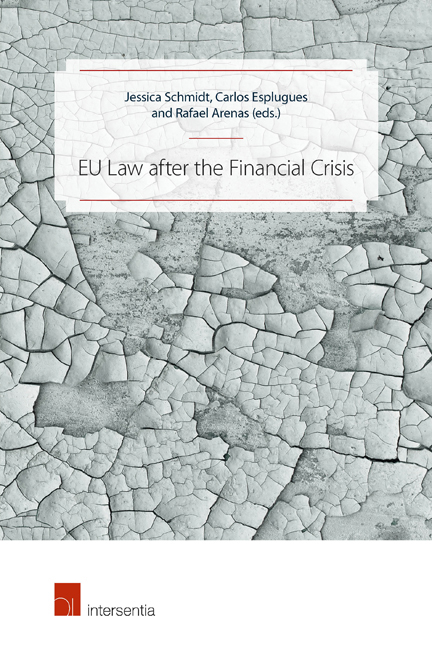Book contents
- Frontmatter
- Contents
- List of Abbreviations
- List of Authors
- Introduction
- PART I RESCUE MECHANISMS AND MONETARY POLICY
- PART II THE IMPACT OF THE FINANCIAL CRISIS ON THE BANKING SECTOR AND CAPITAL MARKETS
- Financial Crisis and European Company and Capital Markets Law
- CoCo Bonds as a Means of Reducing Systemic Risk and their Role within New Regulatory Regimes
- Is EU Financial Law Overly Complex?
- PART III THE FINANCIAL CRISIS AND TAX LAW
- PART IV THE FINANCIAL CRISIS, CONSUMERS AND CONSUMER LAW
- PART V THE FINANCIAL CRISIS AND COMPETITION LAW
- PART VI THE FINANCIAL CRISIS, RESTRUCTURING AND INSOLVENCY LAW
- PART VII THE SOCIAL DIMENSION OF THE FINANCIAL CRISIS AND EU CITIZENSHIP
- PART VIII REFLECTIONS ON THE IMPACT OF THE FINANCIAL CRISIS ON THE GENERAL EUROPEAN LEGAL FRAMEWORK AND THE FUNDAMENTAL “EUROPEAN IDEA”
CoCo Bonds as a Means of Reducing Systemic Risk and their Role within New Regulatory Regimes
from PART II - THE IMPACT OF THE FINANCIAL CRISIS ON THE BANKING SECTOR AND CAPITAL MARKETS
Published online by Cambridge University Press: 13 December 2017
- Frontmatter
- Contents
- List of Abbreviations
- List of Authors
- Introduction
- PART I RESCUE MECHANISMS AND MONETARY POLICY
- PART II THE IMPACT OF THE FINANCIAL CRISIS ON THE BANKING SECTOR AND CAPITAL MARKETS
- Financial Crisis and European Company and Capital Markets Law
- CoCo Bonds as a Means of Reducing Systemic Risk and their Role within New Regulatory Regimes
- Is EU Financial Law Overly Complex?
- PART III THE FINANCIAL CRISIS AND TAX LAW
- PART IV THE FINANCIAL CRISIS, CONSUMERS AND CONSUMER LAW
- PART V THE FINANCIAL CRISIS AND COMPETITION LAW
- PART VI THE FINANCIAL CRISIS, RESTRUCTURING AND INSOLVENCY LAW
- PART VII THE SOCIAL DIMENSION OF THE FINANCIAL CRISIS AND EU CITIZENSHIP
- PART VIII REFLECTIONS ON THE IMPACT OF THE FINANCIAL CRISIS ON THE GENERAL EUROPEAN LEGAL FRAMEWORK AND THE FUNDAMENTAL “EUROPEAN IDEA”
Summary
INTRODUCTION
In the aftermath of the financial crisis, which started in 2007 and was accelerated by the Lehman collapse in 2008, lawmakers sought to tighten up regulatory frameworks especially with regard to the banking sector. As a consequence, EU law underwent significant changes mostly driven by agreements on an international level. One of the most prominent international agreements is the so-called “Basel III” framework setting up stricter capital standards for banks. The reduction of systemic risk was a major concern worldwide and is closely interrelated with topics such as the avoidance of “too big to fail” scenarios in the banking industry. In the course of the financial crisis, governments used taxpayers’ money to rescue some very big and interconnected banks. In this way, an implicit state guarantee for such banks was perpetuated. Taking into consideration some recent mergers in the banking industry, one could argue that the “too big to fail” dilemma became even worse following the 2007 crisis. For instance, in 2008, JPMorgan merged with Bear Stearns, Bank of America bought Merrill Lynch and Wells Fargo acquired Wachovia. However, regulators are trying to make banks more resilient now and to end “too big to fail” scenarios.
One of the means to achieve these goals could be the usage of contingent convertible bonds, which are a relatively new hybrid security known as “CoCo bonds”. CoCo bonds may be converted into equity or written down automatically upon a certain pre-defined trigger event which can be based on a variety of factors such as share prices or capital ratios. New capital standards within the so-called “CRD IV framework” (CRD IV and CRR) and a new Bank Recovery and Resolution Directive10 are the most relevant developments in the regulatory landscape for CoCo bonds in Europe. CoCo bonds can play a significant role under these two highly complex sets of legislation. In addition, there is another regulatory requirement yet to be finalised which will also be of major importance for CoCo bonds. In November 2015, the Financial Stability Board (FSB) issued its final standard on the so-called “total loss-absorbing capacity” (TLAC), which only applies for global systemically important banks. TLAC will require such banks to hold substantially more capital than under the existing CRD IV regime in Europe and consequently could significantly drive up further demand for CoCos.
- Type
- Chapter
- Information
- EU Law after the Financial Crisis , pp. 47 - 64Publisher: IntersentiaPrint publication year: 2016



